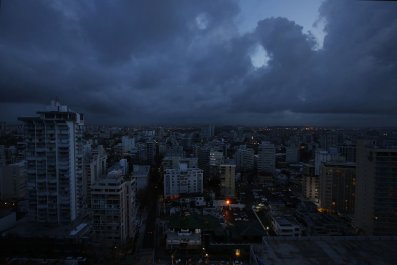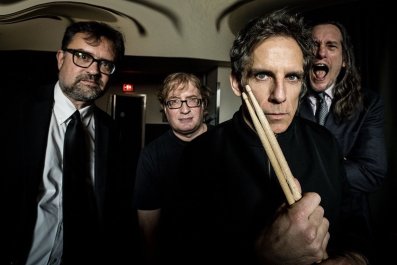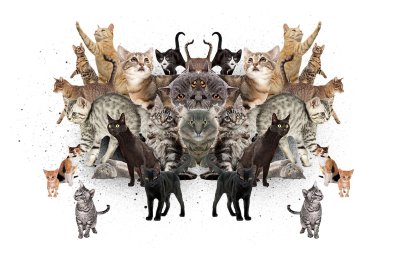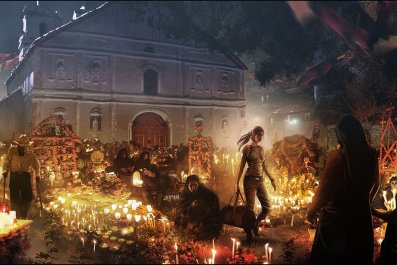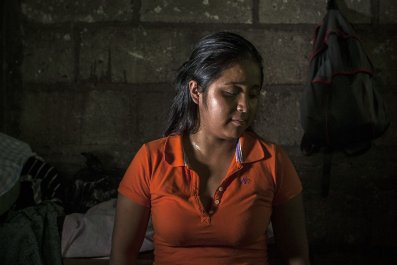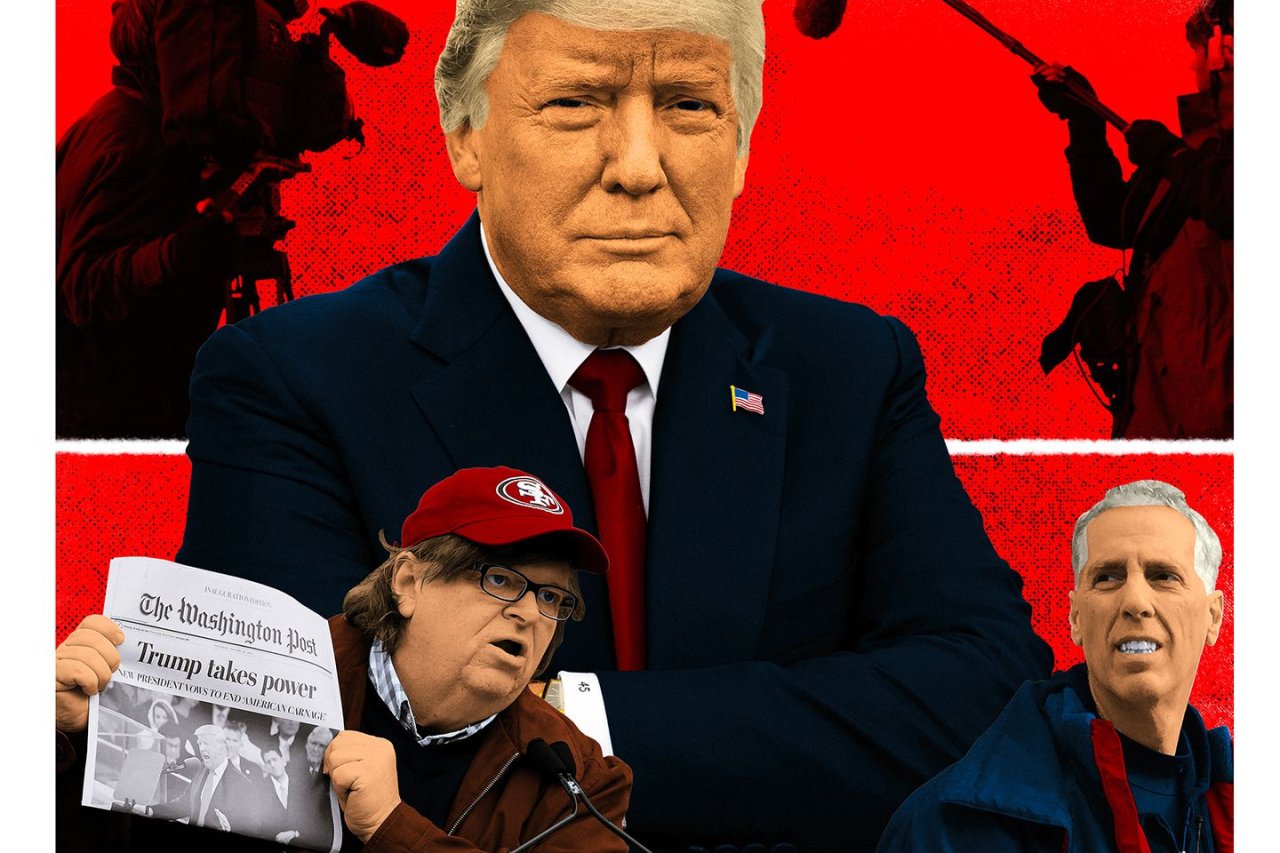
Two years into the Trump era, with the pivotal—perhaps epochal—November midterms looming, two new documentaries begin with cuts of pundits laughingly dismissing Donald Trump's chances of becoming president of the United States.
One is from Oscar-winning director Michael Moore. It's his second film about Trump; the first, 2016's Michael Moore in TrumpLand—performed, shot and edited weeks before the 2016 election—captured Moore's one-man show. In it, he predicted Trump's win; unlike pundits, in fact, he never doubted it. His latest film, Fahrenheit 11/9—which flips the title of 2004's Fahrenheit 9/11—encapsulates his feelings: Election Day 2016 was the political equivalent of the attacks on the World Trade Center and Pentagon.
Moore grew up in working-class Flint, Michigan, a state where Trump beat Hillary Clinton. Jim Stern, a financier and prolific film producer, was also raised in the Midwest but in the progressive enclave of Chicago. He, too, was sensing a political shift in early 2016 and set off with a film crew to Florida, West Virginia and Arizona to meet and understand Trump's supporters. Among the "facts" they share during Stern's American Chaos: how Clinton promised to abolish the Second Amendment her first day in office.
Newsweek interviewed Moore and Stern separately. What follows are combined excerpts from those conversations.
Jim, what made you think Trump was going to win in early 2016?
Stern: I've lived in New York, Chicago, L.A. and San Francisco—all liberal cities—and I come from a political family. The people around me were hoping Trump would win the Republican nomination because they believed there was no way Americans would elect him, guaranteeing Hillary's win. I was absolutely on the other side and very concerned that she would not be able to stretch the electorate to overcome a core that would not leave Trump. And I felt like no one was talking to anybody. We can be snarky and say these poor people are such dopes. I don't believe that.
Michael, when and why did you decide to make your film?
Moore: In January, after a year of Trump. The initial concerns about him were over asking whether or not he was crazy, or thinking he had mental issues, or people patting themselves on the back because he wasn't getting much done. But I began to look at it in a very different way. Far from being crazy, I thought he was a little closer to an evil genius. Trump understood performance art, could read a room and knew how to distract people—especially liberals.
A lot of the people you meet in your film, Jim, are working class—not the socioeconomic group you grew up in. Could you identify with them?
Stern: I spent summers in Minnesota with miners in the boundary waters on fishing trips. My dad had a factory, and he thought it was important for me to know the kinds of people who worked for him. I never felt that I was separate. I thought I was separate as far as the issues, but not as far as social standing or status.
There's a man in the film, from West Virginia, with an edge-of-crazy glare. Were you afraid for your safety in that situation?
Stern: Before the interview, he says to me, "Who are you voting for?" I said, "If I tell you one thing, you will be too comfortable with me, and if I tell you the other, you will be angry." During the interview, his ferocity became clearer, and I was thinking, OK, I gotta get to the car. I didn't feel like he was going to beat me, but that was one situation where I felt a lot of anger.
Can you identify the moment when you realized there was an alternate fact universe?
Stern: It was growing. In West Virginia, they kept saying, "Trump tells the truth and Clinton lies," and that was just categorically wrong. But by the time I visited Arizona, it was glaring. And I couldn't keep it together in a nonconfrontational way when one woman said to me that one in eight voters is voting fraudulently, and they are voting for the Democrats. I challenged her about where she got that, and she said, I just know it. That's when I thought, We are really in trouble.
Is that what the word chaos refers to in your film's title?
Stern: When people stop listening and exist in a kind of echo chamber, the temperature gets turned up, people yell, then what results is chaotic. And obviously Trump himself is a tremendously chaotic figure. Even the subjects in the movie who admire him would say that.
You share a great metaphor in your film, which helps explain what you're talking about.
Stern: The story is that three blind men come across an elephant. One grabs the tail, another a leg and the third the trunk. The first guy thinks it's a rope, the second thinks it's a vine, and the third thinks it's a tree. So I'm watching the debates in California, and they are watching the same debate in West Virginia and having a completely different response.
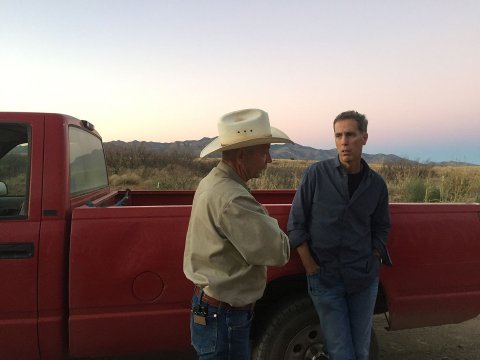
Michael, you make the case that America's democracy is irretrievably broken. Do "the people," in your view, ever win?
Moore: Next year is the hundredth anniversary of women suffrage. Things do get better. But we are a country that takes a step forward, two steps back, and sadly with Obama we took five steps forward and eight steps back. We have swung way, way back—back to whatever there was before Barry Goldwater and the John Birch Society. But, of course, yes, the people win, if we all do our part. I temper that in this film with a warning that we are on the path not to win anymore because we may have elected the last president of the United States. That statement will only be proved false by our action, by getting up off the couch.
Do you think democracy works, Jim?
Stern: I'll answer that in two ways: Absolutely, but I don't think the Electoral College works. It's outrageous that the presidency is the only election in America where the majority does not win. Not the Senate, not governor, not dog catcher.
Michael, some people blame Obama too—that he didn't fight hard enough for Democrats, among other things.
Moore: I don't blame Obama. I love him. Even for those of us who were alive during Kennedy and Eisenhower, he is the best president of our lifetime—without a question. During those eight years, we didn't want to be critical of Obama. We needed to be for him. But the grassroots needed to push. He could never get away with it alone. We needed a leader that encouraged us to raise some hell.
Trump inherited a laissez-faire liberal class of Americans who were somewhat content. We should have been anything but content. First of all, Hillary won, by 3 million votes. Do you think if Trump had won the popular vote but lost the Electoral College that he and his supporters would have remained quiet? With everything that Russians threw at us and all the energy they went to undo our democratic process, they failed to get the majority of Americans to be for Trump.
We still have the last vestiges of our Constitution based in slavery, and only because of the Electoral College were they successful. We act like these wimps. I'm tired of living like that, and I hope my movie will light a fire under people.
Jim, your brother Todd was Obama's climate envoy to the Paris accord, so you have a family connection. What's your take on Obama's culpability?
Stern: While Obama was in a tough position, not releasing information about his Russian hacking concerns had an impact—possibly considerable. I understand that he thought Clinton would win anyway, that Republicans would scream interference if he had come out with this, but in the end, it was true: There was interference, and Clinton lost by 77,000 votes spread over three states. He could have used his office to rally a country around this threat, and that would have, could have, swung the election in an airtight race.
There's a growing sense that Trump merely ripped the curtain off politics as usual. Michael, isn't what's happening now just the nature of American power, minus the window dressing?
Moore: If we survive this, we will be strangely grateful to Trump for having ripped off the mask of our political culture and exposed it for what it was. And he will be credited somewhat for lighting that fire for people to get active.
You say "if we survive this." Your film includes a lot of footage of armed and angry right-wingers. Do you fear civil war?
Moore: I think everybody is afraid of that. During the election, when Trump said that line about wanting the Second Amendment people to be ready [if Clinton should abolish it, as some of his supporters suggested], I think there were—and people won't admit this—a lot of liberals subconsciously relieved that he didn't lose, that we weren't going to have to deal with the 3 percent of the population that owns half the guns
The day you screened Fahrenheit 11/9 in New York, Paul Manafort was convicted and Michael Cohen flipped. Do you think there's a chance the law will catch up with Trump?
Moore: The day after the screening in New York, a woman on Broadway walked up to me and asked, Can we throw the party now? I said no! We have work to do. Do not think for a second that these so-called victories in court have anything to do with removing him. Mueller cannot indict him. All we need to do is focus on November. We are a liberal country, as the movie pointed out. Republicans have not won the popular vote but once in 30 years.



